Nuevo South
Anger
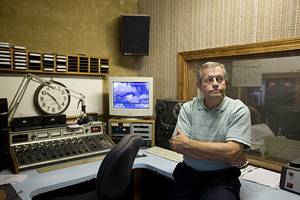
Barry Hayes, the "Bear of the Air," inside WNCA studios in Siler City, N.C., July 30, 2008.
Photo by DL Anderson
Before the wave of Latino immigration, Siler City had the "typical makeup of a small North Carolina town," says Barry Hayes, the owner and operator of the town's only radio station, WNCA AM 1570. We meet him at the station on Highway 64 west of town. It's a low-slung brick building with a white satellite dish in the grass outside. Hayes hosts the morning shift, from six to nine a.m. In what sounds like a practiced line, Hayes adds with a smile, "I'm also the janitor and I mow the yards."
A native of central North Carolina, Hayes moved to Siler City in 1982. "I came here to manage this radio station and just fell in love with the town.... It was a rural town, a blue collar town. Maybe 70 percent white, 30 percent black."
Siler City was also "a dying industrial town" in the 1980s, Hayes says. He watched jobs go away by the hundreds. "We were seeing the textile industry downsizing, we were seeing our furniture industry downsizing, our cotton mill was downsizing, and they continued to downsize for the next 20 years."
Meanwhile, the poultry industry, which had been a mainstay in Siler City for decades, was undergoing an enormous expansion throughout the southeast, just as the whites and blacks who had traditionally worked in the plants began turning up their noses at the chicken jobs. Work in poultry plants is notoriously dangerous, repetitive, and low-paying, not to mention smelly, wet, and, often, bloody.
"And so," says Hayes, "they began attracting the Hispanics into this region."
Ilana Dubester was not a poor Latin American immigrant looking for entry-level work, but she would become a significant player in Siler City. She grew up in Brazil, a middle class woman who thought of herself as white, not Hispanic. She moved to Chicago with her then-husband, and then in 1991, they came to North Carolina to start an organic farm.
We speak with Dubester while strolling Siler City's main street, Chatham Avenue. She points out that the downtown looks pretty healthy these days. Most of the storefronts are occupied, many by Latino-owned shops and restaurants.
It wasn't that way in the early 1990s. "It was ... how do I say this nicely? A depressing scene.... There were a few businesses downtown but most of the downtown area, [these] two streets on Chatham Avenue, were boarded up. There was nothing."
At the same time, Dubester began noticing something in Siler City that she didn't expect: more than a few brown-skinned people speaking Spanish. She soon learned that they'd come to work in the chicken plants, aggressively recruited, especially in Mexico, she says, by Townsend and Gold Kist. "And [the companies] would offer bonuses for people bringing more people, because they were really in shortage of workers."
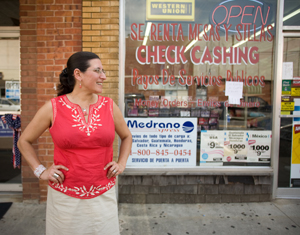
Ilana Dubester on Chatham Avenue. Dubester helped found Siler City's Hispanic Liaison, or El Vinculo Hispano.
Photo by DL Anderson
By 1995, Siler City was home to several thousand Latinos and Dubester had a new vocation. She helped to found Hispanic Liaison, or El Vinculo Hispano, one of North Carolina's first service and advocacy organizations serving Latinos.
By the mid-1990s, she recalls, it was sinking in among Siler City residents that the growing Latino population was not a fleeting phenomenon. That year, the town government created a Hispanic Task Force to address what it saw as growing problems and miscommunications.
Barry Hayes, the radio station owner, says longtime locals were getting frustrated.
"Housing was a problem," he says. "We had [Latino] folks who were moving into vacant houses and then they would be inviting their relatives to come and pretty soon we would have a house with ten, fifteen, who knows, maybe twenty people living in one house, and they'd be parking their cars in the front yard and hanging their laundry out in the bushes and so forth."
It was reasonable, Hayes says, for community leaders to offer the newcomers an education "as to our ways here in Siler City."
The Hispanic Task Force got off to a poor start, Dubester says, by failing to name any Hispanic members. Next, it created a brochure to instruct Latinos on the community's "expectations."
"The Spanish [in the brochure] was really poor. It was hard to understand, some of it didn't make any sense, but it was about junk in your yard, domestic violence, drugs. Like, in this country it's not OK to beat your wife. It was a very offensive brochure and made a lot of assumptions about us and who we are and who we aren't and what we are about, and it was all about, we're a bunch of criminals and we've got to learn how to behave."
As the 1990s came to an end, says Paul Cuadros, the soccer coach and author, many of Siler City's longtime residents moved past denial and depression into a new stage of grief: anger.
"And that's what we saw in 1999, 2000 in Siler City: a lot of anger that eventually bubbled forth and culminated in this anti-immigrant rally that I think the town still tries to live down. The David Duke rally."
Grand Wizard
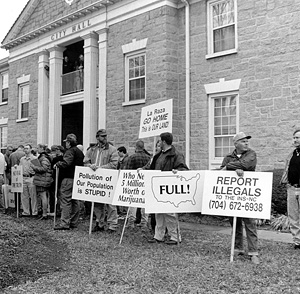
Supporters at a David Duke rally at City Hall in Siler City, N.C.. Duke was once the head of the Ku Klux Klan.
Photo by Paul Cuadros
Invited by a handful of local white supremacists, the visiting David Duke put Siler City uncomfortably in the news in early April of 2000. The onetime grand wizard of the Knights of the Ku Klux Klan, Louisiana state representative, and failed candidate for several higher offices spoke in front of City Hall.
"They maybe had 50 or 60 people" who were clearly Duke sympathizers, recalls Ilana Dubester. Duke's admirers carried anti-immigrant signs and a few wore jackets emblazoned with the Confederate battle flag. Outnumbering the Duke faithful were a couple hundred curious observers, counter-protesters, and police officers.
"The reason why we're here today," Duke said over a p.a. system, "is because we have a deep and abiding love for our heritage. For this town that your fathers and mothers, and grandfathers, and great grandfathers and great grandmothers, they built with their sweat and their sacrifice and their vision."
Veering between xenophobic and vaguely populist notes, Duke blamed the influx of "illegal aliens and non-American citizens" on the poultry companies that hire them "to save a few bucks. And I guess they're doing it to pluck the chickens. But let me tell you, it's not just the chickens that are getting plucked in Chatham County!
"Ladies and gentlemen," Duke went on, "what are we supposed to do? Just be quiet? Just keep our mouth shut while our country and our community and our town and our schools and our heritage is taken away from us? ... I say no! I say never!"
"This was not representative of the mindset here in Siler City at all," says Barry Hayes of WNCA Radio. "And we kind of hung our heads when that happened and couldn't wait for it to go away."
Maybe so, says Ilana Dubester, then the head of Hispanic Liaison. But "my opinion is, if that rally had been organized by some upstanding citizen and not tied to the KKK, to the Grand Wizard, there would have been a lot more people. But because they had the KKK in it, with David Duke, I mean, who wants to be seen with the KKK? A few do. We know who they are. We've got their pictures. But not many people are willing to do that nowadays."
In the wake of the Duke embarrassment, Chatham County became just the third county in North Carolina to establish a human rights commission. The local school district, with increased funding from the county, greatly expanded its ESL programs and eventually established an innovative bilingual education program in Siler City Elementary School. City leaders took steps to improve the substandard low-income housing in which many Latino families were living, and to help some Latinos move out of trailer parks into more integrated neighborhoods, reducing what Police Chief Gary Tyson calls the town's "slum areas."
There's a clear consensus in town that the David Duke rally was a turning point in Siler City - for the good. The former Grand Wizard forced residents and their leaders to take a position, says Cuadros. "Were they going to stand down there with David Duke and the Klan against the Latino population, or were they going to try and find some other kind of accommodation to be able to live [together] in that town?"
Knowing the Code
The accommodations have come on all sides. For years, some Siler City residents stewed with resentment over the way some Latinos tossed trash in their yards or parked furniture outside their houses. Now, city officials and Latino advocates work together to minimize such resentments.
One day in late April, Tim Riffe drives his city government vehicle up to the Hispanic Liaison offices in downtown Siler City, where he picks up his friend, Marcia Espinola, a Liaison staffer.
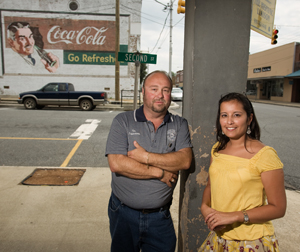
Marcia Espinola and Tim Riffe, who have been working together to enforce the city code in Spanish-speaking neighborhoods.
Photo by DL Anderson
Riffe is a middle-aged North Carolina native with a beard and a pony tail; he's the Code Enforcement Officer for the city. "There's a set of guidelines in the town code, or laws, they're actually laws, that deals somewhat with aesthetics and things like that ... and my job is to enforce - and I try to use kid's gloves to do that. I don't try to, you know, scare anybody into anything or anything else, I ask them politely."
Today he's getting voluntary help from Espinola, a Chilean immigrant and the organization's Acting Associate Director. The two climb into Riffe's car and set out for the first of a list of addresses on Riffe's clipboard. On other days he visits the homes of white and black residents who are violating city codes in their domestic upkeep; this day, with Espinola along, he'll concentrate on Spanish-speaking households.
"Tim is doing a good job," Espinola says. "The problem is he doesn't speak enough Spanish. We were agreed that the Hispanic community was needing some help."
At one house with a couch on its porch, a Latino man comes to the door and Espinola introduces herself and Riffe. She explains to the man that the couch must be removed, along with graffiti on the door of his garage. He can take the couch to the curb and the city will pick it up for free, she explains.
Riffe pitches in that he understands the man may not have painted the graffiti himself, that someone else may have done it.
"I said that," says Espinola with a chuckle.
Riffe laughs at himself. "I had no clue what you said!"
"You want to say something else?" Espinola asks.
"Just thanks for your cooperation," Riffe says. "Thank you. Gracias."
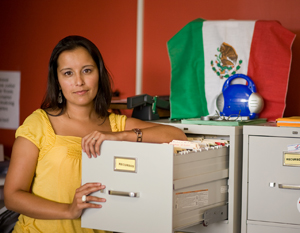
Espinola at the Hispanic Liaison. She says collaborating with Riffe has helped Siler City and its Hispanic community.
Photo by DL Anderson
In the car on the way to another home, Riffe says he's sympathetic to former campesinos who've landed in an American town where lawn care ranks as a high cultural priority.
"You know that some of these people came from some incredibly wretched living conditions," he says. "And, you know, [they] don't know the customs and stuff."
"Some people say, well, the Hispanics don't clean their yards and everything," Espinola adds, "but maybe it's because they don't understand the language. Because after we went last year, talking to, I don't know, 10 places, 20 places? Everybody cleaned their houses."
Riffe has been in the Code Inspector's job for eight years. "It's not nearly as bad as it was when I came here," he says.
The Hispanic Liaison's collaboration with Riffe is "a big, big help for the town and for Tim," says Espinola. "But more important than that, [it's a] help for the Hispanic community."
And hopefully, she adds, with a teasing smile, "he's going to speak Spanish next year."
"Ha," Riffe says. "I know about a hundred Spanish words. Maybe 200 now. I've been working on it!"
Continue to part 3
